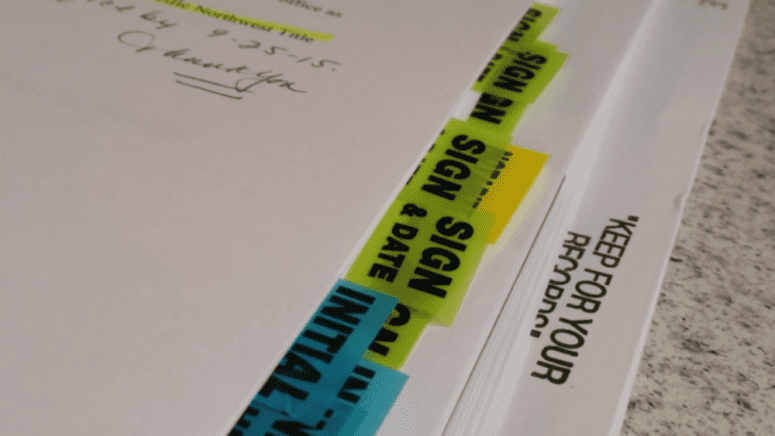How a Closing Attorney Shields Your Home Sale From Legal Trouble
- Published on
- 7 min read
-
Corinne Rivera, Staff WriterCloseCorinne Rivera Staff Writer
Corinne is a journalist with a passion for real estate, travel, and visual arts. She has a B.A. in Broadcast Journalism from San Francisco State University. When she’s not creating content, you can find her exploring open houses, watching HGTV, or redesigning her apartment... again.
-
 Taryn Tacher, Senior EditorClose
Taryn Tacher, Senior EditorClose Taryn Tacher Senior Editor
Taryn Tacher Senior EditorTaryn Tacher is the senior editorial operations manager and senior editor for HomeLight's Resource Centers. With eight years of editorial and operations experience, she previously managed editorial operations at Contently and content partnerships at Conde Nast. Taryn holds a bachelor's from the University of Florida College of Journalism, and she's written for GQ, Teen Vogue, Glamour, Allure, and Variety.
It’s closing time and the pressure’s on. Even with a rock-solid offer in hand, the hard part of your home sale is yet to come. According to the National Association of Realtors, unexpected obstacles that crop up before closing delay 13% of home sales, and the thorniest issues may call for legal expertise beyond what your real estate agent can provide.
Before the ink dries on your contract, every little detail must be in perfect order, or you could get embroiled in a lawsuit down the line.
Cue the closing attorney.
While your real estate agent organizes the deal, your closing attorney acts as an extra pair of eyes to protect you and your assets at the time of closing — and long after the deal is done.
Top real estate agents and practicing attorneys who’ve witnessed legal nightmares unfold at closing agree: sellers should lawyer up. Here’s how you can take full advantage of the services your closing attorney has to offer.
Disclaimer: Information in this article is meant to be used for educational purposes only and not to be taken as legal advice. HomeLight always encourages you to reach out to a legal advisor concerning your own situation.
What does a real estate attorney do at closing?
A closing attorney will tackle any contractual dispute or legal issues that come to light during the closing process. And even if zero problems arise, the attorney will draft and review every document line by line for accuracy.
Once you have finalized the purchase and sale agreement, the document that details the terms of the offer you’ve accepted, the closing process begins. You and the buyer enter escrow, where documents and payments are pulled together to complete the sale.
Your closing attorney’s job is to thoroughly read everything and identify any issues that might put you in jeopardy.
You can count on your closing attorney to handle the following:
Clear the title of liens and judgments
Once you’ve accepted an offer, the escrow agent, title company or buyer’s agent will order the title report for your house. The title search will uncover any issues, including trust, divorce, and estate complications, unpaid balances from lenders, property taxes, and more.
If anything is uncovered during the title search, your real estate attorney at closing will help prepare all of the necessary documentation to clear the title. While it could take months of exhaustive work, it’s necessary in order for the sale to close.
Back up your agent in negotiations
After the buyer receives the home inspection report, they may want to negotiate on price, repairs, or repair credits.
Depending on the severity of issues found, a real estate attorney and your real estate agent can negotiate the best way to move forward. This could include repairing the items, proving the items to be adequate, providing a repair credit to the buyer, or lowering your asking price.
Pore over escrow documents to catch any red flags
Once you open escrow, your escrow officer will send you documents to fill out, which include the grant deed, state-specific forms, the property information statement, and more. Your closing attorney will guide you through this paperwork and be able to identify any mistakes before you sign it.
Your real estate agent, who’s likely seen thousands of escrow documents before, will be familiar with the process and be able to do the basic parsing of the paperwork. But as with any important documents, especially in a transaction as large as real estate, it’s smart to have a lawyer review them before signing.
“In terms of closings for a general sale, it’s always good to have someone there to make sure all of the T’s are crossed and the I’s are dotted,” says Brett Wasserman, a practicing real estate attorney. “Because you don’t want to give them grounds to come back and sue you after the fact for misrepresentation or breach of contract.”
Review fees incurred by the home sale
When you sell your home, you have to pay closing fees and other charges when selling a house, including your real estate agent’s commission, your outstanding mortgage balance, property taxes, homeowners insurance, and more, depending on your situation.
A real estate attorney will review these fees before you pay them to make sure you’re getting the best deal possible, and that there aren’t any errors or miscalculations that could cost you. A real estate attorney who has experience with finance pays off here; you want someone who knows how to do the math.
Why you should seriously consider hiring an attorney at closing
If you try to get through a sticky sale without legal help, you could risk losing the sale, or at least your time and money. Here’s what might happen:
The sale could fall through
If and when an issue comes up before closing, you’ll have to resolve it before you can move forward. The alternative is that the entire home sale could fall through.
A top real estate agent will work between you and the buyer to negotiate over the property itself by helping you craft counteroffers, pick a closing date, etc. to keep the sale moving forward. But, there are more complex issues that go beyond standard negotiations that could get you into legal hot water — and your real estate agent won’t have the expertise to get you out.
A real estate attorney can walk you through complicated situations and minimize the blow to your home sale and your personal assets. Some situations that pose issues that could derail the sale are:
- You’re selling the house from a trust.
- You’re selling the house to your kids or other family members.
- You’re selling a house with a lien and have judgments on your title.
- You have tenants living on the property.
- You’re selling the house due to divorce.
If you find yourself in any of the above scenarios, contact a real estate attorney to protect you throughout your home sale.
You could sacrifice time and money
In the most simple transactions, an error in the language of the contract can be virtually unnoticeable to those who aren’t trained to see it.
If you or your real estate agent miss something, even the smallest mistake can haunt you down the line. A closing attorney will thoroughly review every document to make sure that buyers aren’t taking advantage of you.
“I see it time and time again,” says Wasserman. “The money that’s invested up front in retaining a lawyer is pennies to the dollar in what’s spent when it hits the fan and you need a lawyer.”
He adds that if you hire a real estate attorney to protect you right from the beginning of the sale, it will save you time and money. So, it’s better to invest in a lawyer to help you from the get-go than to wait until there’s actually something wrong.
You could open the door for lawsuits
If you know about an issue with the property and you don’t disclose it, such as a rotted subfloor, or if a repair job that the buyer requested was done incorrectly, you could be liable for extra costs.
If you conceal or hide issues that you are legally required to disclose, it’ll come back to bite you down the road. Be honest about your property up front to avoid a lawsuit, and have a real estate attorney in your corner for protection.
Why a closing attorney is your best guarantee for an airtight home sale
With a real estate attorney by your side during the closing of your home sale, you’ll avoid issues that could cost you time, money, and the deal itself. Plus, an attorney’s professional presence will help you rest easy during those weeks between contract and close.
For this reason, some states require that home sellers have an attorney present during closing. Even if you aren’t required to hire one, the cost for the added protection of an attorney is just a fraction of the cost of the house that’s on the line. Talk to your real estate agent to find trusted real estate attorneys in your area, or search for one on your state or county bar association website.
Article Image Source: (Pxhere)




